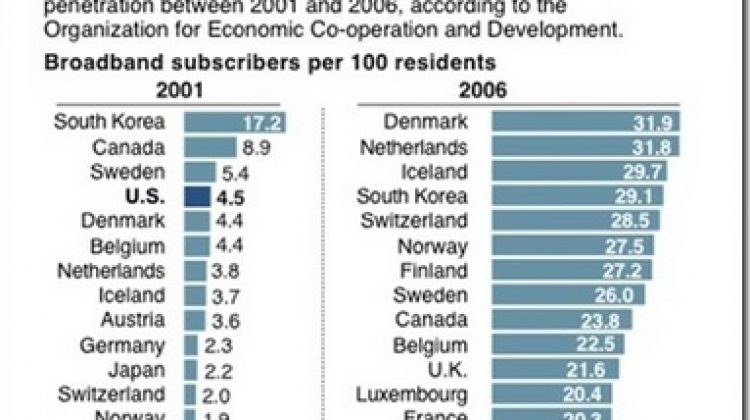United States Failing In Internet Connectivity
One thing I try to emphasis to the blogs I handle the tech work on is keeping page sizes low. The reason for this is because there are so many people in this country that are stuck with dial-up internet. As it turns out the United States has taken a big plunge in internet speed […]

One thing I try to emphasis to the blogs I handle the tech work on is keeping page sizes low. The reason for this is because there are so many people in this country that are stuck with dial-up internet. As it turns out the United States has taken a big plunge in internet speed and availabilty over the past five years. This graphic gives a good representation of that.

Of course the Bush administration is to blame for a lot of this:
What’s less clear is how badly the country that gave birth to the Internet is doing, and whether the government needs to step in and do something about it. The Bush administration has tried to foster broadband adoption with a hands-off approach. If that’s seen as a failure by the next administration, the policy may change.
So when Al Gore got all the heat for saying he helped invent the internet, what the right-wing smear machine didn’t know is that Bush would be instrumental in destroying it.
I don’t live in an entirely rural area. I am between Hamilton, Ohio and Oxford, Ohio. Hamilton is a decent size city and Oxford is the home of Miami University. While I do have the benefit of high-speed internet, I got neighbors not so fortunate. You can literally go one mile up the road and there is no broadband. My broadband is also limited to cable. ADSL is not available in my area.
Considering the importance of the internet in our economy and education, shouldn’t the country work harder to make sure everyone has access to top speeds at reasonable prices? I have friends in the U.K. who have internet speeds 5 times of mine and they pay less than half. How can a family that is struggling afford that for their kids education?
George Bush might not put us back in the stone age, but he sure is working to keep us stuck in the 90’s. At least the Democratic controlled Congress is taking notice on this issue:
In a move to get a clearer picture of where the U.S. stands, the House Energy and Commerce Committee on Tuesday approved legislation that would develop an annual inventory of existing broadband services — including the types, advertised speeds and actual number of subscribers — available to households and businesses across the nation.
The bill, introduced by Rep. Ed Markey, D-Mass., is intended to provide policy makers with improved data so they can better use grants and subsidies to target areas lacking high-speed Internet access. He said in a statement last week that promoting broadband would help spur job growth, access to health care and education and promote innovation among other benefits.
That sure is a far better statement than Ted Stevens blaming our internet problems on tubes that are full. Other countries are experiencing enormous internet growth, while we are shrinking. This is not the fault of the technology, but rather the fault of the telecom companies. They really need to work to correct this problem before we are left in the dust. Think of the economic boom we would have if we started building up to date networks.






